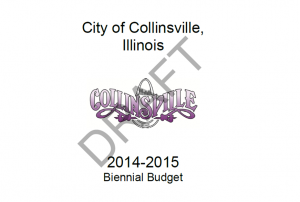The recently released draft biennial budget for the City of Collinsville calls for increased capital improvement spending in 2014 and increased water rates, but a stable property tax levy for the seventh consecutive year.
The 2014 and 2015 budgets include projected revenues for 2014 of approximately $37.3 million – a 13.11 percent increase over 2013 – and approximately $36 million for 2015 – a 3.68 percent decrease from 2014. Expenditures and expenses for 2014 are projected to be $41.4 million – a 19.44 percent increase over 2013 projections – and $36.8 million for 2015 – an 11.15 percent decrease from 2014.
 The budget for both years is considered to be balanced, despite the revenue and expense differences, because the projected ending balances in the General and Enterprise funds will be between 10-15 percent of the projected revenue. Salaries, benefits and contractual services are primarily paid from these funds.
The budget for both years is considered to be balanced, despite the revenue and expense differences, because the projected ending balances in the General and Enterprise funds will be between 10-15 percent of the projected revenue. Salaries, benefits and contractual services are primarily paid from these funds.
A resolution will be introduced at the Nov. 12 City Council meeting to increase the ending balance threshold to 15-20% in the General and Enterprise funds. If the resolution is adopted, the city is projecting a balanced budget for the two years, Tamara Ammann, finance director for the city, said. “We always budget conservatively, and spend more conservatively,” Ammann said.
The city’s expenses are expected to outstrip revenue in Special Revenue Funds. These funds are earmarked for projects and can fluctuate widely each year, Amman said. Existing balances will cover the shortfall in 2014 and 2015. “If the money isn’t there, we won’t spend it,” Ammann said.
At $9.8 million, capital improvement projects represent nearly a quarter of the 2014 budget. The amount the city spends on capital projects is projected to drop to $4.22 million in 2015. Grants are expected to contribute $3.5 million to the projects over the two years. The majority of the remaining money will come from Special Funds.
Included among the 96 budgeted capital improvements over the two years is a sidewalk near Twin Echo Elementary school, design for the new water treatment plant, and major roadwork on South Clinton Street and Summit Avenue.
Funds from the Tax Increment Finance District in uptown Collinsville are budgeted to pay for $7.2 million of the capital projects. Ammann said the TIF fund is working exactly as planned. About 90 percent of the TIF funds will be used for infrastructure and street projects, City Manager Scott Williams said.
Construction costs for the new water treatment plant will be funded through the water and wastewater fund. To pay for the construction, water rates are expected to jump 38 percent in 2014 and 3 percent in 2015. Sewer rates are projected to increase by 3 percent each year. Even after the increases, Collinsville water customers will pay a rate that is about average compared to surrounding communities, Ammann said.
Sales taxes are the largest revenue source for Collinsville, comprising 28 percent of total projected revenue for 2014 and 30 percent of the 2015 budget. Sales taxes include general, home rule, business district and TIF sales tax. Water and wastewater fees, at 24 percent, are the second largest income source for the city, followed by property tax at 10 percent and income at 7 percent.
The city’s largest expense is salaries, projected at 30 and 35 percent of the budget for 2014 and 2015 respectively. Ammann said this is expected because the city provides services through its employees. The second largest expense is projected to be contractual services, such as garbage service, rebates, legal services and liability insurance. Contractual services are anticipated to comprise 23 percent of the city’s expenses over the next two years.
Not included in the budget are the Fire and Police pension funds. Paid for through local property taxes, the State of Illinois assesses the tax levy each year for the funds. The city collects the money and deposits it into a fiduciary fund. Collinsville has no control over the levy amount or how the money is spent.
The amount the city is required to allocate to the Fire and Police pension funds has increased dramatically over the past 10 years. Collinsville taxpayers contributed $580,470 to both funds, combined, in 2003. The Police Pension Fund alone will consume $891,946 of taxpayer money in 2013. The Fire Pension Fund will cost $608,024.
The increase in money required to be allocated to the pension funds, coupled with a stagnant property tax rate, has resulted in less money in the city’s General Fund. The fund received over $1.3 million in 2003, but will receive only $983,030 in 2013.
The disproportionate amount of property taxes funneled to the pension funds is expected to subside in 2040, when the funds are both fully funded, Ammann said.
Although the biennial budget is one document, it will be presented to the City Council at two meetings. The 2014 Budget and public hearing will be on the City Council’s Dec. 9 agenda. A public hearing will also precede the adoption of the 2015 budget during the Jan. 13, 2014 City Council meeting.
In May, Moody’s assigned the city a Aa3 bond rating for having “a stable financial position supported by the revenue raising flexibility afforded by home-rule status and solid reserves; and a manageable debt burden with ongoing discussions regarding potential future payment options for non-general obligation securities.”
The budget can be viewed at http://www2.collinsvilleil.org/images/docs/budget/2014-2015DRAFTBUDGET.pdf.
Related story: http://metroindependent.com/2013/09/25/collinsville-to-build-new-water-treatment-building/1342/



